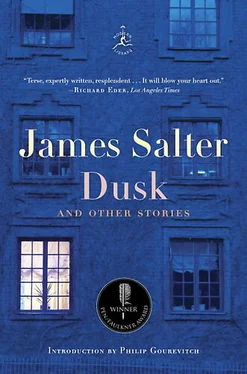“Did you hear that?” she asked. Her voice was hushed, she longed for the myths of the past. Her eyes had darkness around them, her flesh was old.
“How do you look like him?” She wanted to hear it recited.
“I don’t,” he said.
They did not hear him. They were arguing about his childhood, various details of it, poems he had memorized, his beautiful hair. What a good student he had been. How grown-up when he ate, the fork too large for his hand. His chin was like his father’s, they said. The shape of his head.
“In the back,” his aunt said.
“A beautiful head,” his mother confirmed. “You have a perfect head, did you know that?”
Afterward he lay on the couch and listened as they cleared the dishes. He closed his eyes. Everything was familiar to him, phrases he had heard before, quarrels about the past, even the smell of the cushions beneath his head. In the bedroom was a collection of photographs in ill-fitting frames. In them, if one traced the progression, was a face growing older and older, more and more unpromising. Had he really written all those earnest letters preserved in shoe boxes together with schoolbooks and folded programs? He was sleeping in the museum of his life.
He left at four. The doorman was reading the newspaper, his collar unbuttoned, the air surrounding him rich with odors of cooking. He didn’t bother to look up as Nile went out. He was absorbed in a description of two young women whose bound bodies had been found on the bank of a canal. There were no pictures, only those from a high school yearbook. It was June. The street was lined with cars, the gutters melting.
The shops were closed. In their windows, abandoned to afternoon, were displays of books, cosmetics, leather clothes. He lingered before them. A great longing for money, a thirst rose in him, a desire to be recognized. He was walking for the hundredth time on streets which in no way acknowledged him, past endless apartments, consulates, banks. He came to the fifties, behind the great hotels. The streets were dank, like servants’ quarters. Paper lay everywhere, envelopes, empty packages of cigarettes.
In Jeanine’s apartment it was better. The floor was polished. Her breath seemed sweet.
“Have you been out?” he asked her.
“No, not yet.”
“The streets are melting,” he said. “You weren’t working, were you?”
“I was reading.”
From her windows one could see the second-floor salon in the rear of the Plaza in which hairdressers worked. It was red, with mirrors that multiplied its secrets. Naked, on certain afternoons, they had watched its silent acts.
“What are you reading?” he asked.
“Gogol.”
“Gogol…” He closed his eyes and began to recite, “In the carriage sat a gentleman, not handsome but not bad-looking, not too stout and not too thin, not old, but not so very young…”
“What a memory you have.”
“Listen, what novel is this? For a long time I used to go to bed early…”
“That’s too easy,” she said.
She was sitting on the couch, her legs drawn up beneath her, the book near her hand.
“I guess it is,” he said. “Did you know this about Gogol? He died a virgin.”
“Is that true?”
“The Russians are a little curious that way,” he said. “Chekhov himself thought once a year was sufficient for a writer.”
He had told her that before, he realized.
“Not everyone agrees with that,” he murmured. “You know who I saw on the street yesterday? Dressed like a banker. Even his shoes.”
“Who?”
Nile described him. After a moment she knew who he must be talking about.
“He’s written a new book,” she said.
“So I hear. I thought he was going to hold out his ring for me to kiss. I said, listen, tell me one thing, honestly: all the money, the attention…”
“You didn’t.”
Nile smiled. The teeth his mother wept over were revealed.
“He was terrified. He knew what I was going to say. He had everything, everybody was talking about him, and all I had was a pin. A needle. If I pushed, it would go straight to the heart.”
She had a boy’s face and arms with a faint shadow of muscle. Her fingernails were bitten clean. The afternoon light which had somehow found its way into the room gleamed from her knees. She was from Montana. When they first met, Nile had seen her as complaisant, which excited him, even stupid, but he discovered it was only a vast distance, perhaps of childhood, which surrounded her. She revealed herself in simple, unexpected acts, like a farmboy undressing. As she sat on the couch, one arm was exposed beside her. Within its elbow he could see the long, rich artery curved down to her wrist. It was full. It lay without beating.
She had been married. Her past astonished him. Her body bore no trace of it, not even a memory, it seemed. All she had learned was how to live alone. In the bathroom were soaps with the name printed on them, soaps that had never been wet. There were fresh towels, flowers in a blue glass. The bed was flat and smooth. There were books, fruit, announcements stuck in the edge of the mirror.
“What did you actually ask him?” she said.
“Do you have any wine?” Nile said. While she was gone, he continued in a louder voice, “He’s afraid of me. He’s afraid of me because I’ve accomplished nothing.”
He looked up. Plaster was flaking from the ceiling.
“You know what Cocteau said,” he called. “There’s a fame worse than failure. I asked him if he thought he really deserved it all.”
“And what did he say?”
“I don’t remember. What’s this?” He took the bottle of sea-colored glass she carried. The label was slightly stained. “A Pauillac. I don’t remember this. Did I buy it?”
“No.”
“I didn’t think so.” He smelled it. “Very good. Someone gave it to you,” he suggested.
She filled his glass.
“Do you want to go to a film?” he asked.
“I don’t think so.”
He looked at the wine.
“No?” he said.
She was silent. After a moment she said, “I can’t.”
He began to inspect titles in the bookcase near him, many he had never read.
“How’s your mother?” he asked. “I like your mother.” He opened one of the books. “Do you write to her?”
“Sometimes.”
“You know, Viking is interested in me,” he said abruptly. “They’re interested in my stories. They want me to expand Lovenights.”
“I’ve always liked that story,” she said.
“I’m already working. I’m getting up very early. They want me to have a photograph made.”
“Who did you see at Viking?”
“I forget his name. He’s, uh… dark hair, he’s about my size. I should know his name. Well, what’s the difference?”
She went into the bedroom to change her clothes. He started to follow her.
“Don’t,” she said.
He sat down again. He could hear occasional, ordinary sounds, drawers opening and being shut, periods of silence. It was as if she were packing.
“Where are you going?” he called, looking at the floor.
She was brushing her hair. He could hear the swift, rhythmic strokes. She was facing herself in the mirror, not even aware of him. He was like a letter lying on the table, the half-read Gogol, like the wine. When she emerged, he could not look at her. He sat slouched, like a passionate child.
“Jeanine,” he said, “I know I’ve disappointed you. But it’s true about Viking.”
“I know.”
“I’ll be very busy…. Do you have to go just now?”
“I’m a bit late.”
“No, you’re not,” he said. “Please.”
She could not answer.
“Anyway, I have to go home and work,” he said. “Where are you going?”
Читать дальше












